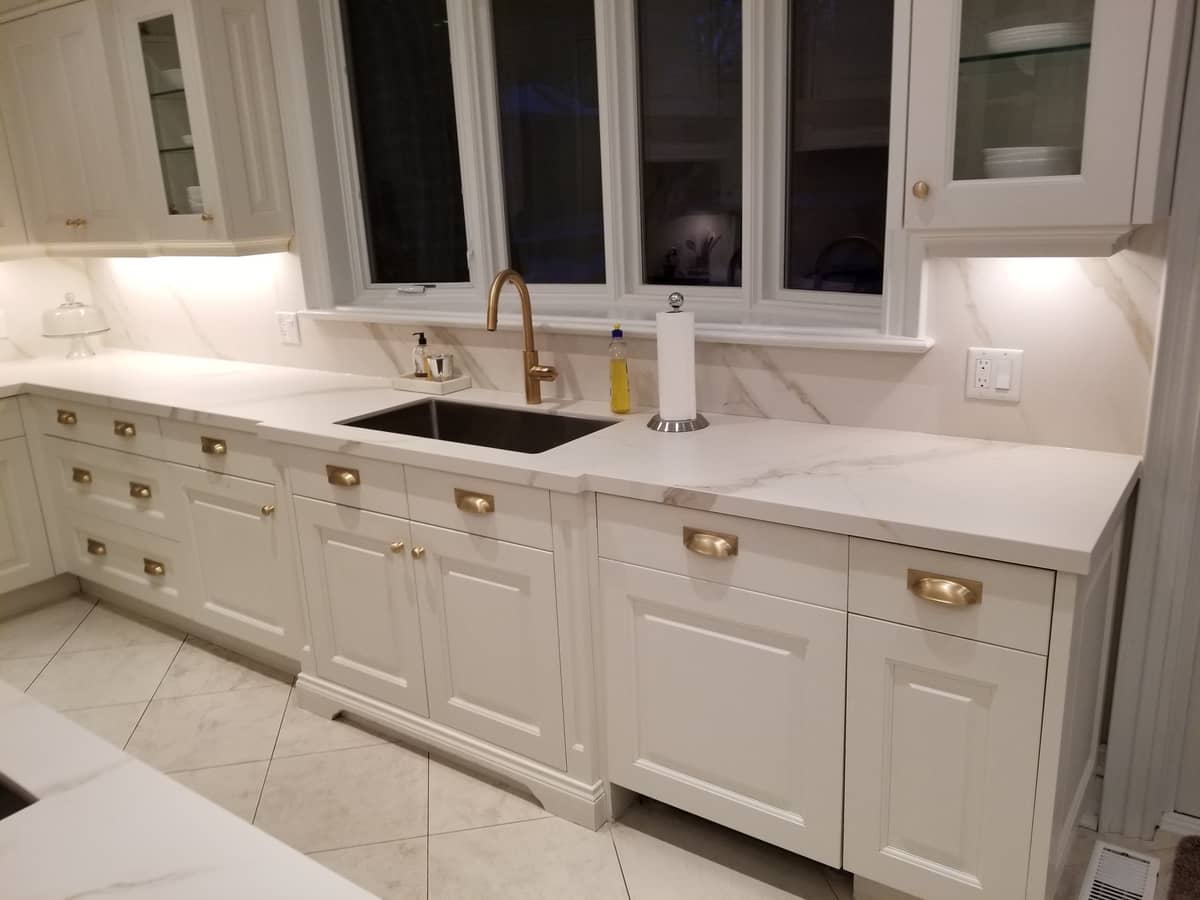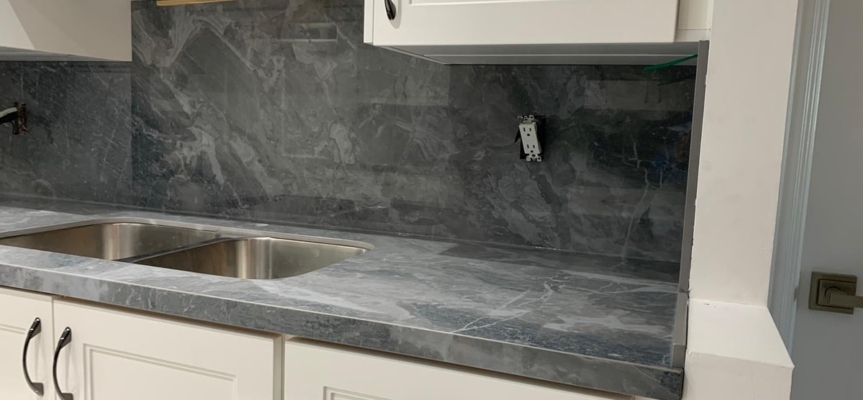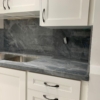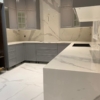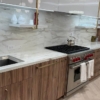Porcelain slabs offer enhanced durability, design versatility, superior hygiene, and cost-effectiveness over time, making them an ideal choice for high-traffic areas in projects requiring both aesthetic appeal and functionality.
When looking for the best material for countertops, you might feel overwhelmed by the dizzying number of choices available. Though some might feel that natural stone countertops are always the best choice, engineered stones such as porcelain might make you reconsider that thought. If you’ve been looking into porcelain vs marble countertops, there are a few key distinctions that can help make your choice easier.
At Counter Culture, we have more than 25 years of experience in stone fabrication and have dedicated the last decade to the study of large-format porcelain slab. We know that porcelain can be the ideal material choice for virtually any surface in a home. In this post, we compare marble vs. porcelain countertops to help you understand which option is most suitable for your space. Whether you are a home builder, designer, or owner, we have the expertise you’ve been searching for and are the porcelain slab fabricator you can depend on.
Porcelain vs Marble, which is Best for Countertops?
When considering which is better for your project, knowing the unique properties of porcelain countertops vs marble is essential. Though porcelain and marble can look very similar, they require different levels of maintenance. Below we outline key areas for consideration. Whether you are looking for porcelain kitchen countertops or are deciding between marble and porcelain bathroom vanities, these factors should help you make an informed decision.
Cleanliness – when looking into porcelain vs marble countertop options, hygiene and cleanliness should always be a top concern. Though beautiful to look at, porcelain is a porous material. This means that it can absorb liquids such as water, oils, and foods. Beyond harbouring bacteria, this can also lead to staining. As porcelain is a non-porous material, worry over stains and bacteria is lessened. Though adequate cleaning is still required, you can feel confident that unwanted bacteria will not leech into your porcelain countertops.
Porcelain’s non-porous surface makes it an excellent choice for environments where hygiene is a priority, such as kitchens and healthcare facilities. It does not harbor bacteria or odors and is easily cleaned with just soap and water. Expanding on the hygienic benefits of porcelain, especially in the context of current health-conscious trends, could resonate well with clients focused on cleanliness.
Durability – marble is a softer material and, as such, is prone to scratching and chipping. Marble countertops may even become dull over time due to how easily it can scratch. Porcelain, on the other hand, is a very durable material that cannot be easily scratched or chipped. Though porcelain slab can be difficult to install and is fragile during the installation process, once installed, it is one of the more durable countertop options.
Porcelain slabs offer remarkable durability and resistance to scratches, chips, and heat, making them ideal for high-traffic areas like kitchens and bathrooms. Unlike marble, porcelain does not require frequent sealing, reducing both maintenance costs and effort. Emphasizing porcelain’s ability to withstand daily wear and tear without losing its aesthetic appeal could be crucial for clients prioritizing long-term value.
Maintenance – day to day maintenance of both marble and porcelain countertops is simple. Cleaning with soap and water is enough to keep either surface clean or safe to use. Keep in mind that marble requires regular sealing while porcelain does not. For a worry-free countertop option, porcelain is a great option.
Design Versatility – Porcelain slabs come in an extensive range of colors and patterns, including designs that mimic natural stone, such as marble. This variety allows designers and builders to achieve the desired look without the limitations often imposed by the natural veining and color variations found in marble. Highlighting specific case studies or visual examples where porcelain was chosen for its aesthetic flexibility could provide tangible insights to potential clients.
Knowing which material is best for kitchen countertops can sometimes feel difficult. However, if you are looking for a countertop option that is low-maintenance, looks beautiful, and is made for real life, porcelain slab might just be your best bet.
Our Completed Porcelain Kitchen Countertop Projects
What Other Countertop Options Could I Consider?
Porcelain slab is a fantastic choice for countertops that offers both beauty and practicality. Though you can’t go wrong with porcelain, looking into all of your options is always a great idea. Our post, Porcelain Countertops vs Granite Countertops, helps you compare another popular countertop choice.
Is Porcelain Slab Expensive?
When considering the price point, porcelain slab is in line with other luxury countertop options. Keep in mind that long-term, porcelain may be a more affordable option as it offers increased durability and less maintenance than other natural stone countertops. Our post, Is Porcelain Slab Affordable, offers more insight into the cost of porcelain slab countertops.
While the initial cost of porcelain can be comparable to that of high-end marble, porcelain slabs often emerge as a more cost-effective solution over time due to their low maintenance and longevity. Discussing the financial benefits, including potential savings on repairs and replacements, would provide a more comprehensive understanding of why porcelain is a prudent investment for large-scale projects.
How Can I Find a Porcelain Slab Fabricator Near Me?
Though it has been popular in Europe for some time, porcelain slab is still gaining popularity in North America. For this reason, finding an experienced porcelain slab fabricator can be challenging. Our post, Where Can I Buy Porcelain Slab, offers insight into finding a porcelain slab fabricator that can accommodate your project.
Choosing between porcelain and marble countertops depends on the specific needs and preferences of the project. However, for those seeking a durable, low-maintenance, and aesthetically versatile option, porcelain slabs offer distinct advantages that marble cannot match. Encouraging clients to consider these benefits can help them make informed decisions that align with their project goals and long-term satisfaction.
Porcelain slab and marble are both beautiful options, though porcelain may be a more suitable option for those who truly live in and use their kitchens. If you are looking to learn more about porcelain slab, contact the experts at Counter Culture. We look forward to showing you just how incredible porcelain slab can be.





